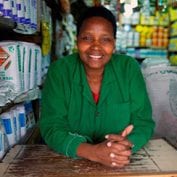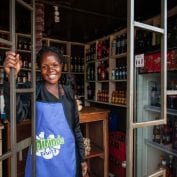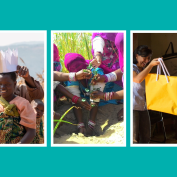Help struggling farmers and small business owners lift themselves out of poverty.

Micro-Retail
Small Businesses in Developing Countries Are Essential to Reducing Poverty
Small shops (“micro-retailers”) are vital to local economies, selling $11 trillion worth of goods annually in developing countries. In some countries, small shops sell 80 to 90 percent of all consumer goods, often to base-of-the-pyramid customers that larger retailers miss. If these local entrepreneurs could reach their full potential, their businesses would be game-changers for developing economies. But a lack of business skills and access to markets and financial services holds them back.
Our Work in Micro-Retail
Over the years, TechnoServe has worked with a range of key partners–including the Citi Foundation, the elea Foundation, the Mastercard Centre for Inclusive Growth, and the Moody’s Foundation–to develop a proven approach to helping small retailers maximize their economic potential. Our results suggest that with the right support, micro-retailers in the developing world can increase their incomes by more than 30%.
Through delivery of a combination of in-shop advisory services and group training, TechnoServe has helped more than 7,000 small shops to increase their sales and profits and create jobs. Our programs work with shop owners on best practices in 1) shop management/customer care, 2) sourcing and inventory management, 3) recordkeeping and 4) merchandising — all critical to improving store operations and increasing profitability. We also help store owners to form business groups that facilitate bulk ordering and direct linkages to suppliers and manufacturers. Our approach is also addressing access to finance constraints, through rotating savings and credit associations and mutual credit guarantees.
Technology can be particularly transformative in this sector, and so we have piloted digital technologies that help shop owners manage inventory, sales, and finances. As TechnoServe seeks to work with hundreds of thousands more micro-retailers in the developing world, we will apply even more digital innovation in order to scale impact.
Featured Micro-Retail Projects
Smart Duka: Empowering Shopkeepers in Nairobi
"Mom and pop” shops play a critical role in developing economies around the world. In partnership with the elea Foundation and Citi Foundation, TechnoServe is working to increase the profitability of 840 high-potential shops in Nairobi, the majority of which are women-operated or women-owned.

Pan-African Youth Entrepreneur Development (PAYED)
The Pan-African Youth Entrepreneur Development (PAYED) program will provide training and tailored advisory support 600 young entrepreneurs in Kenya, Nigeria, and Côte d’Ivoire to develop opportunities in the micro-retail sector.

Who benefits from supporting small businesses in developing countries?
Shopkeepers
TechnoServe has worked with more than 7,000 owners of small businesses in developing countries across Africa, 69% of whom are youth, and 64% of whom are women. Helping these entrepreneurs improve the operations and profitability of their stores has enabled them to achieve average income increases of about 30%.
Local workers
When entrepreneurs learn the skills to grow their business and improve their sales and profitability, they can then hire more local workers and contribute to wider local economic development.
Local consumers of small businesses
Improving the quality, quantity, and variety of products offered in small shops — in addition to the overall shopping experience — helps local consumers obtain more of the products they need in an easier, more timely fashion.
Recent Micro-Retail Blog Posts
In Benin, Young Entrepreneurs are Tackling the Plastic Problem

Ask a TechnoServe Expert: Juan Carlos Thomas on Entrepreneurship

Kenyan President’s State Visit: Advancing Shared Development Priorities

Kenyan President’s State Visit: Advancing Shared Development Priorities

From ‘COP29’ to ‘Smallholders’: 7 International Development Terms to Know in 2024

Vote for the Photo of the Month: March 2024

"There is always more to what any man can do, but at some point in our lives we will always need a mentor. For me, PAYED saved me. This program has actually marked my new beginning.”
Christian Above, Entrepreneurs in Nigeria
The Smart Duka program is working with enterprising shop owners in Nairobi’s informal settlements to increase the profitability of their small retail businesses. A partnership between TechnoServe, the elea Foundation, and Citi Foundation, Smart Duka is equipping shop owners with the business knowledge and management skills they need to optimize their stores’ operations and financial performance.



